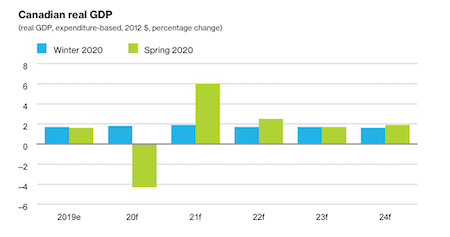Conference Board forecasts GDP drop of 25% in Q2
The Conference Board of Canada is calling the economic impact of the COVID-19 pandemic “the worst economic downturn” the country has experienced in decades.
 Its latest Provincial Outlook document for spring 2020 shows that Canadian real GDP will drop by 25 percent in the second quarter of this year—the largest single-quarter decline in economic output since the board began tracking such data in 1961. For the year as a whole, the board projects a total GDP contraction of 4.3 percent.
Its latest Provincial Outlook document for spring 2020 shows that Canadian real GDP will drop by 25 percent in the second quarter of this year—the largest single-quarter decline in economic output since the board began tracking such data in 1961. For the year as a whole, the board projects a total GDP contraction of 4.3 percent.
“Physical distancing requirements as well as the closure of non-essential businesses have brought a large portion of the economy to a standstill,” says Alicia Macdonald, the Conference Board’s associate director of economic forecasting. “As a result, every province has fallen into recession. Our forecast expects that the downturn will be short-lived and growth will resume in the second half of the year, assuming businesses slowly reopen over the spring and summer.”
The COVID-19 pandemic has devastated the economic outlook for all provinces. Making matters worse is the collapse in oil prices, which is worsening the economic downtown in oil-producing provinces like Alberta and Newfoundland and Labrador.
Hardest hit of all provinces will be Alberta. The province is suffering the effects of COVID as well as plunging oil prices that are due to not only the pandemic, but also a price war between Russia and Saudi Arabia. The board expects Alberta’s economic to contract by 5.8 percent this year. That figure would be the worst annual decline on record. The good news is, the board expects the province’s economy to add 6.1 percent growth in 2021.
Saskatchewan’s economy is also projected to see a contraction of 5 percent. The negative impacts of COVID-19 will be further amplified by weaknesses in the province’s mining industry. The province is Canada’s main producer of canola, but exports have been negatively impacted by China’s ban on Canadian canola. The board projects the province’s economy will rebound by 5.4 percent in 2021, however.
Although Ontario is expected to be among those provinces least hard hit, the Conference Board is nevertheless predicting the province’s GDP to drop by 3.2 percent. Helping to stem Ontario’s tide somewhat is a large base of professional services workers in Ottawa and Toronto in particular (who can work remotely), and the repurposing of some facilities to produce medical supplies.
On an annual basis, the province is expected to lose just over 100,000 jobs—with most of that decline front-loaded to the first half of the year. The province will add over 240,000 jobs in 2021 as the economy continues to recover.
The board expects Ontario’s economy to rebound in 2021 with growth rates at or above 6 percent.








